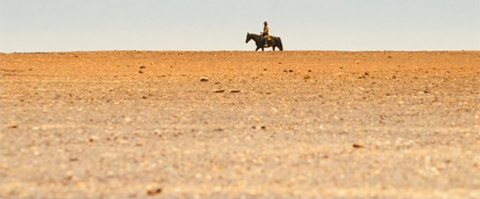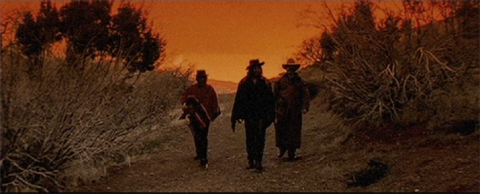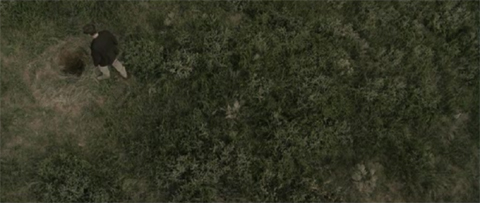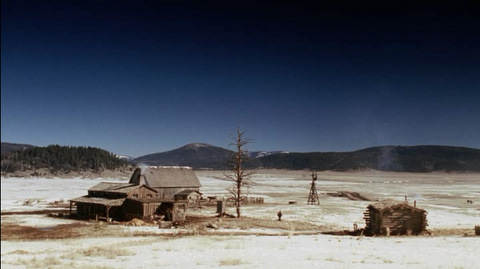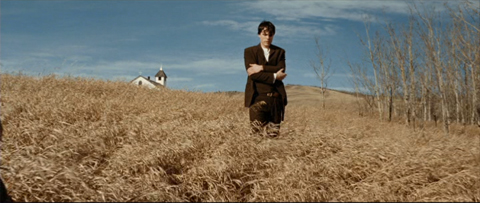America’s once-dominant film genre dimmed with the rise of summer blockbusters, gritty urban crime dramas, and science fiction epics, but it never died out completely. Many contemporary Westerns don’t bring much new to the party, but dusty tales of crooked lawmen and honest cowpokes still draw interesting talent as writers, directors, and actors want to put their own stamps on the genre. For the fifth Movie Week of 2011 I checked out Westerns made since the year 2000.
The Films
The Missing (2003) dir. Ron Howard
Appaloosa (2008) dir. Ed Harris
Open Range (2003) dir. Kevin Costner
The Proposition (2005) dir. John Hillcoat
Sukiyaki Western Django (2007) dir. Takashi Miike
The Legend of God’s Gun (2007) dir. Mike Bruce
The Burrowers (2008) dir. J.T. Petty
The Assassination of Jesse James by the Coward Robert Ford (2007) dir. Andrew Dominik
The Western strikes me as a genre made up of landscapes and themes more than characters. There are plenty of films about specific outlaws and lawmen but so many Westerns are really less concerned with character specifics than they are with using the characters as ciphers for abstract ideas. Nearly every town has a crooked sherriff or businessman running good people into the ground. It’s not really important who the character is, but he’s needed to establish a call for justice. You will often find an uneducated man who drives to do what he thinks is right in spite of his inability to articulate why. Those characters don’t usually explain how they wound up on the cattle trail, but we know that they represent innocence and the compulsion to do good. And as a counterpoint to the image of the immaculate cowboy hero of the 1940s and 50s, contemporary Westerns tend to feature flawed and even unlikable heroes who act out of duty or a need for atonement. Justified or not, these heroes’ checkered histories give them an opportunity for redemption. The films don’t tell us much about who these people are–we simply know them through the ideas that they represent.
Even when the heroes are less-than-scrupulous, the Western story gives them a mission that the audience can cheer. Many of the films begin with a vicious display of corruption, violence, or abused power that needs to be avenged. That opening scene of violence usually sets the tone and lets the audience know how the film will approach violence later on. The Proposition starts with a grisly firefight that leaves pools of blood in the dust and chunks of viscera on the walls. Appaloosa opens with a matter-of-fact assassination where bodies drop almost as suddenly as guns are drawn. The Burrowers opens on a home invasion that is heard more than seen as the perpetrators lurk and scratch just out of sight. Open Range goes against the grain by opening with sweeping, sentimental music and a pastoral cattle drive, but soon enough evil and injustice befalls the cattle men and sets them on a path for vengeance. In each film, we know from the onset that there will be trouble soaked in blood.
Since these themes are so well-worn and the visual language of the Western is so well-understood, it winds up being a genre that people spin off in all sorts of creative directions. Horror Westerns (Near Dark, The Burrowers,) Cowboy Sci-Fi (Cowboys and Aliens, Wild Wild West,) Asian Westerns (Tears of the Black Tiger, The Good, The Bad, The Weird, and this week’s Sukiyaki Western Django,) and low-budget rifs (Dead Man, The Legend of God’s Gun) all take Western themes and visual trappings and run with them. Sometimes the mashups or odd juxtapositions work. Tears of the Black Tiger is a fantastic acid trip of a movie full of melodrama, comedy, and bloody action. Sukiyaki Western Django on the other hand tries for the same kind of manic style and winds up being fun to look at but not a lot of fun to figure out. Where Jim Jarmusch took a slim cast and an indie aesthetic to make the beautifully spartan Dead Man, a bunch of rock musicians strapped on cowboy costumes and made a long-form music video for an album called The Legend of God’s Gun–a movie with great music that feels self-indulgent and half-baked as a film experience. The Burrowers takes the white man’s fear of Indians and misplaces it as a band of men get torn down by vicious mole-men. But the Western lends itself to these diversions because after nearly a century of cowboy movies, we get it already.
In fact, if there’s one common thread running through these recent films, it’s the fact that they all assume a certain familiarity with the language of the Western. The saloons and general stores, ranch houses, stables, and wagons are all familiar to the point that they are simple backgrounds. These films all assume that the audience has seen a Western or two, or at least knows what one looks like and what to expect from a frontier story, and they use that familiarity to explore darkness. Westerns of yesteryear weren’t always about valiant heroes on white horses, but they were for the most part considerably less gray.
Unforgiven helped to pave the way for deconstructed and reinvented stories of the old west, and all of these new films lie in its wake. For me, Unforgiven was a bit like the Watchmen of Westerns. Once I had seen Eastwood’s film, there was no going back to the cleanly-established archetypes of Western films from previous eras. It was the kind of transcendent work that caused me to view the things that came before it differently, and its influence seems to pervade cowboy movies made ever since. In order to shock and surprise, these newer movies almost have to be built in a familiar playground. They play upon our expectations and they expose the impurities that often exist in quests for justice and vengeance. They often don’t end well for anyone.
The familiarity is easy to come by because these movies share not only common themes but a common visual syntax. The landscapes, the grass, the horses, the warped glass windows, and the dirt roads all paint a picture of a specific time and place. The Western gives film makers an excuse to exploit sunsets, wide shots, and the contrast of open blue skies against golden harvest fields. All of these films trade in dirt and grime and blood (though none more so than The Proposition which seems simply to be made out of the stuff,) but they all revel in the natural beauty of a world less-manipulated by humanity. They show us a paradoxical time when people dressed up nicely despite the fact that they rarely afforded the luxury to bathe or wash. They send people on missions that take days or weeks across uncivilized terrain. Westerns of an earlier era may have romanticized the open plains and the red clay hills, but this newer batch of films paints those same landscapes as isolating, harsh, and often unforgiving. The shot of Casey Affleck above says it all.
Without the bustle and distraction of cities and cars and modern life, Robert Ford is left alone with his thoughts, brooding and ultimately giving in to his weakness. I finished the week with The Assassination of Jesse James by the Coward Robert Ford because I’ve yet to find another contemporary Western that comes close to being as strong of a film as that one. It’s a remarkable piece of work that balances beauty and ugliness sublimely. Both Jesse James and Robert Ford take turns being sympathetic and despicable and by the end, the film’s tragedy is tearfully earned. It’s a movie that doesn’t dance around the darkness and violence of the old west, but doesn’t drag the audience through the stench of it either. It’s the kind of movie that gives me hope that we might turn that most American of genres around for it to show us something new once more.
Other Movie Weeks in 2011
Non-Godzilla Kaiju Week
Woody Allen Week
Secret Agent Week
Asian Action Week

